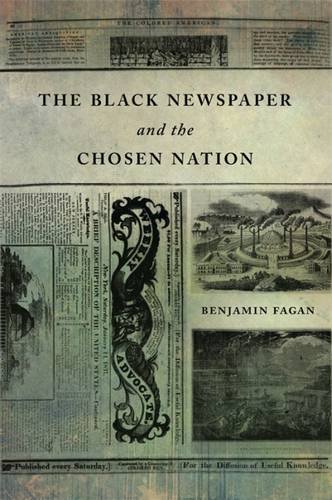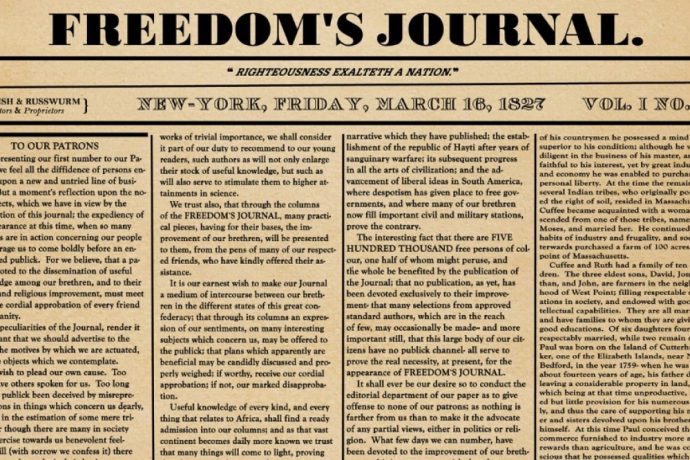What inspired you to write The Black Newspaper and the Chosen Nation?
After spending about a decade immersed in the archive of the early black press, I am still struck by the urgency and intensity of the writing that fills the pages of antebellum black newspapers.
Black editors such as Mary Ann Shadd Cary, Samuel Cornish, Philip Bell, Robert and Thomas Hamilton, and, of course, Frederick Douglass, overcame not only the standard obstacles of newspaper publishing (financing, distribution, delinquent subscribers, etc.), but also a broader white supremacist society that denied, in the most abhorrent and violent ways imaginable, the basic humanity of black people.
So the very existence of antebellum black newspapers represents an absolutely massive triumph that demands recognition and celebration. In other words, it was the black newspapers themselves, and the people who made them, that inspired me to write a book about the early black press.

The Black Newspaper and the Chosen Nation
Benjamin P. Fagan
University of Georgia Press
June 2016
Initially, though, this was going to be a book about the ways in which black newspapers theorized and enacted American national identity. But as I read and reread the pages of Freedom’s Journal, the Colored American, the North Star, the Provincial Freeman, and the Weekly Anglo-African, I couldn’t help but notice the overwhelming presence of scriptural references and other kinds of religious rhetoric. It’s not that the papers weren’t working through questions of national identity, but what seemed even more crucial to recover was how particular religious ideas and practices, which I group under the umbrella of chosenness, fundamentally shaped the ways in which early black newspapers imagined and attempted to enact black national identity.
Scholars such as Frances Smith Foster and Chanta Haywood have long called for a sustained attention to the religious registers of early black print. Their work, coupled with the content of the newspapers themselves, inspired me to write a book focused on the role that religion played in antebellum black newspapers.
What’s the most important take-home message for readers?
At its core, The Black Newspaper and the Chosen Nation is a story about a group of black newspapers that profoundly shaped black and white culture and society in the decades leading up to the Civil War, but about which we know very little. I hope that readers of the book walk away with a greater understanding for and appreciation of the importance of early black newspapers and the people who made them.
The newspaper was, by leaps and bounds, the most important media of the early nineteenth century. I often think of it as the television of the twentieth century or the internet of the twenty-first. So I want readers to come away with the realization that, if we want to understand nineteenth-century African-American history, literature, politics—and of course religion—we have to consult black newspapers. With that in mind, I hope that readers come away with a desire to know more. My book traces one main thread (black chosenness) through five newspapers, and this approach means that I’ve only scratched the surface of the archive of the early black press. A handful of scholars are doing really tremendous work on early black newspapers, but there’s so much more do be done.
Beyond helping readers to appreciate and understand the early black press, the central argument of The Black Newspaper and the Chosen Nation is that, in the decades leading up to the American Civil War, black Americans used their newspapers to not only proclaim their status as God’s chosen nation on Earth, but to then apply that faith in black chosenness to a range of on-the-ground struggles for black liberation.
So I hope that readers of the book not only come away with a better understanding of the contours of black chosenness, but also with a sense of how that idea has fundamentally shaped the fight for black freedom in the United States.
Throughout the book, I also explore how black newspapers used black chosenness to engage with and at times upend prevailing notions of American exceptionalism. After all, the notion that white Americans are God’s chosen people arrived with some of the earliest European colonists, and was subsequently incorporated as a founding myth of the United States. This particular version of American chosenness has been used to justify a whole host of government policies, including the enslavement of black men, women, and children, as well as the genocidal slaughter of American Indians.
But the presence of black chosenness in antebellum black newspapers teaches us that the very people that the United States worked so hard to enslave and oppress could seize the mantle of American chosenness and use it to imagine and attempt to enact a different kind of American nation. So I hope that this book will encourage readers to think about the fluid, evolving, and always-contested nature of American chosenness.
Is there anything you had to leave out?
Early on I decided to focus intently on a small number of newspapers, rather than try to tackle the whole range of black newspapers published before the Civil War. I’m still happy with this decision to go for depth over breadth, but it means that there are lots of papers that I didn’t have a chance to include.
I would have really liked to spend some time with Frederick Douglass’ Paper, or the Christian Recorder, but happily Eric Gardner has recently published an excellent book on the latter paper. At one point I also considered taking the book into the second half of the nineteenth century, since black newspapers appeared throughout the South immediately after the end of the Civil War. And, again, there’s so much more to say even about the five newspapers that I do cover in my book. But the vast number of people and papers that I wasn’t able to concentrate on in the book just underscores how much work there is left to do on the black press.
What are some of the biggest misconceptions about your topic?
Outside of a small group of specialists in early African-American print culture, most people that I’ve talked to about my subject are surprised to learn that black women and men had a press of their own before the Civil War. So the biggest misconception about my topic may very well be that my topic doesn’t exist.
And even when antebellum black newspapers have made it into conversations about American history, or the history of journalism, they are typically cast as mainly abolitionist publications. To be sure, all of the papers that I discuss in the book agitated for an end to slavery, but they also took up a host of other issues.
Did you have a specific audience in mind when writing?
I really tried to write the book for a general audience, as I think that the people and papers that it treats will be interesting to anyone interested in American history, literature, culture, and religion. I’ve written the book in a narrative style, and kept most of the specific scholarly debates in the introduction and the footnotes.
But I also had in mind the handful of other scholars who work on early African-American print cultures, and especially those who paved the way for my own research. The study of early African-American print is having something of a renaissance right now, with a number of books, conferences, and journal special issues devoted to the topic emerging in the past few years. So it could seem (and some have claimed) that this is a newly invented field. But this is not at all the case.
My book depends upon the work of pioneering scholars who have sometimes been ignored in the rush to stake “new” academic territory. I wrote The Black Press and the Chosen Nation with these scholars in mind, and hope that if they read the book they will enjoy it.
Are you hoping to just inform readers? Entertain them? Piss them off?
I hope that my book can serve as a way to amplify the words and ideas of the women and men who made antebellum black newspapers. So there’s certainly an educational function to the book, in that I’m introducing readers to a group of massively influential, but largely overlooked, black editors.
And I do hope that readers will find the book enjoyable. Contributors to antebellum black newspapers were smart, inspiring, and incisive writers (who were also often incredibly funny). These qualities make black newspapers themselves a real joy to read, and I hope that some of that pleasure makes its way to my book’s readers.
But antebellum black newspapers at times took up positions that readers then and now could find objectionable and upsetting. Indeed, these publications were designed to agitate their readers, black and white alike. And since what I’ve tried to do above all is let the black newspapers speak for themselves, that spirit of agitation may very well carry over to my book’s readers.
What alternative title would you give the book?
I really wanted to find a great quote from the newspapers themselves that would work as a title, and for about an afternoon toyed with the idea of “Righteousness Exalteth a Nation,” which is the motto of Freedom’s Journal. But I also wanted a simple title, without an explanatory subtitle, so that wasn’t going to work. Ultimately, I’m pleased with where we’ve ended up.
How do you feel about the cover?
I love the cover. When the book was released, multiple people got in touch with me just to say how impressed they were with the cover (though I hope they read the book too). And to be clear I had absolutely nothing to do with it, and am so grateful for the design team at the University of Georgia Press for producing such a beautiful work. Moreover, since it’s a collage of page images from some of the newspapers that I focus on in the book, the cover really fulfills the mission of showcasing the papers themselves.
Is there a book out there you wish you had written? Which one? Why?
I’m not sure there’s a particular book I wish I had written, but there are certainly writers (academic and otherwise) whose work I sincerely admire. I’m a big fan of scholars who can tell complex and important stories in a way that is truly a pleasure to read. There’s often a discussion of writing in an “accessible” manner, but these are folks who’ve gone way beyond that and just written what I consider to be beautiful books. Some of the recent examples I’m thinking of are Carla Peterson’s Black Gotham, Walter Johnson’s River of Dark Dreams, and Christopher Hager’s Word by Word. And I really love Fred Moten’s In the Break, which is written in a different style from those I’ve just listed but brilliant and a blast to read.
What’s your next book?
I have a few projects in the works, including a couple of edited collections of scholarly essays and a big, long-term project on histories of black revolution. But first I’m going to write a book that focuses on four correspondents to Frederick Douglass’ Paper. During the 1850s, Douglass’s paper served as the venue for some of the most sophisticated, smart writing out there, in the form of letters from correspondents located across the country.
Almost none of this writing has been analyzed or reprinted. In order to make these letters accessible to the widest audience possible, my book is going have an openly accessible born-digital component, which will be built as part of a collaborative, larger project undertaken by the Black Press Research Collective.





